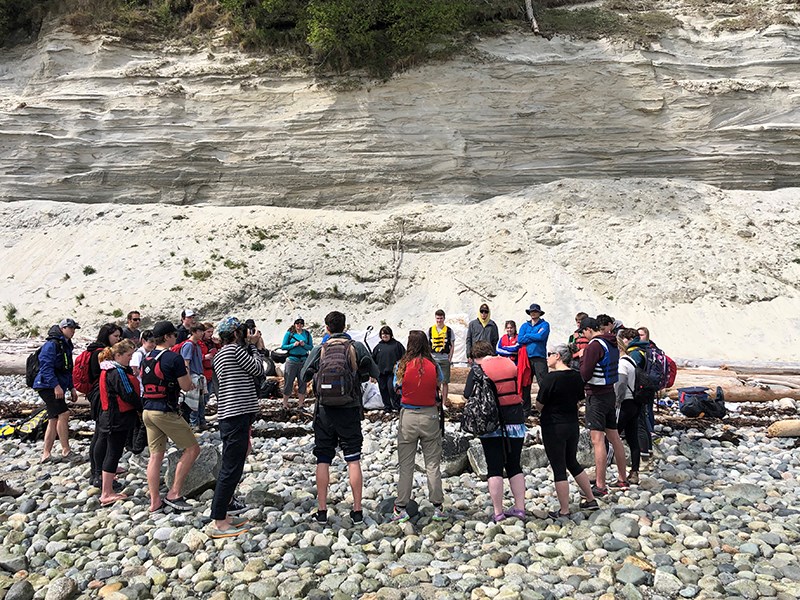Did you know marine life can become entangled and killed in ghost nets, plastic bands and other types of debris? Worldwide, more than 200 species are impacted daily by debris entanglement.
Our Coast Mountain Academy class decided this needed to be addressed, which is why we put enthusiasm and effort into running the second annual Marine Debris Project. In planning, we drew from knowledge of last year’s cleanup. We invited other Brooks Secondary School clubs and classes as we wanted to ensure it was a collaborative effort. Our hope was to spark conversations and passion around the issue.
Ryan Barfoot, our instructor, suggests the cleanup is a worthy action to rally around but that the “true value of projects like these is the questions people are asking, in the conversations people are having while sifting through the debris and back at home around the dinner table.”
We were sure this would help other kids understand this issue involves everyone. After all, our consumer demands and choices result in this kind of pollution. We also wanted to show that we all have the power to make a difference, either as one person or as a group.
Upon arrival at Ahgykson (or Harwood Island) from Powell River, we were amazed at the pristine appearance of the beach. We could see a couple massive pieces of Styrofoam, but aside from that it looked fairly “clean.” It was not until we had actually come ashore that it began to dawn on the group that this was not the case.
As we set up our sorting stations and began to spread out, we found bottles, flip flops, tires, rope, even kids’ toys that had simply washed ashore, carried by currents far and wide. It was an amazing educational tool and conversation starter, discussing how a flip flop labelled “Tokyo Laundry” ended up on our small strip of beach. Tracking that journey along with those of the many other pieces of garbage helped to facilitate the understanding that humanity and cultures are interconnected by the Earth’s oceans.
One of the hardest things to accept was the amount of Styrofoam found on the beach. To make matters worse, only one type of Styrofoam we found could be recycled. Furthermore, we could not manage to pick up every little nurdle that had flaked off.
We spent two days sorting the many types of debris into the giant white bags, hauling chunks of Styrofoam bigger than ourselves down the beach, and shouting exuberantly if we found something surprising. Although we worked hard and had fun, we were overwhelmed by the scale of sorting stations at the end of each day.
We clustered all the bags together and the amount up close was shocking. However, we hope the memory of seeing every bag compiled together as we left in the boats will not be forgotten by the participants. Looking back at the beach, the bags sat there looking huge and daunting, reminding everyone that this was only the first step. It showed our progress and our actions, but undeniably illustrated a need for change.
Our ocean is a major ecosystem, and it is not a dumping ground. We need to advocate for it; we need to be that voice for change.
The four barge-loads of debris collected will be displayed near Willingdon Beach until it is processed at Trash Bash on Saturday May 4.
The Marine Debris Project was supported by School District 47, Brooks, qathet Regional District's Let’s Talk Trash Team, Tla’amin Nation, First Credit Union, C-TOW and the Canadian Coast Guard.
Ally Boyd is a grade 11 student at Brooks Secondary School in Powell River.



